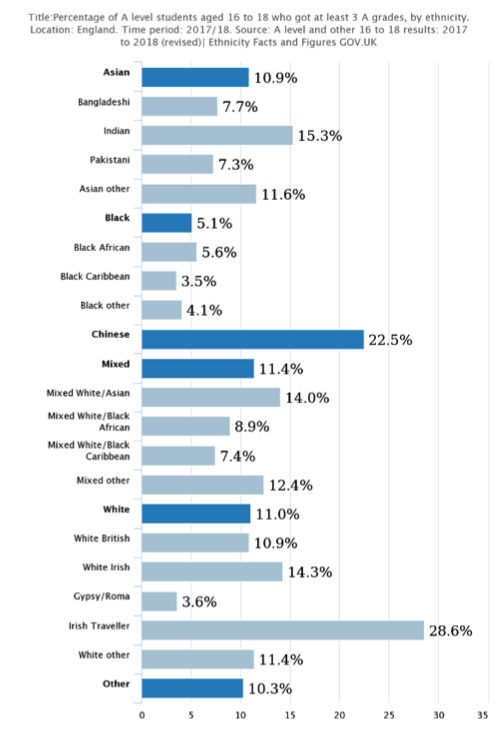Shailen Popat
Black Lives Matter. This statement rings true in the context of violence and murder but also in terms of quality of life. One crucial factor in quality of life is attainment at school. Over the last 40 years, black students have been attaining persistently lower outcomes at age 18 than their white peers even though both groups commence their schooling demonstrating high ability and capability (Archer et al 2007). The Department of Education School Census (2019) suggested that the gap in performance is widening and many Black students in England’s schools are not sharing the higher educational standards achieved by other ethnic groups over the last decade with less than 50% of black pupils achieving 5 or more GCSEs at grade A* to C including English and Maths. This is particularly concerning given that The Tomlinson Enquiry (2008:2) concluded that ‘… the education system over the past 50 years has developed within a socio-political context in which there has been a lack of political will to ensure that all groups were fairly and equitably treated’. This half century of unfairness has impacted upon choices available to Black students after they leave the schools system.
For example, Oxford University’s Annual Admissions Statistics Report shows that just 3.2% of all students admitted to undergraduate degrees in 2019 were ethnic British Black. An ethnic Black student applying to Oxford is half as likely to get in as a white student. Not only are not enough ethnic Black students applying, but those who do, are far less likely to get in. There are concerted attempts by Oxford at both a college and university level to improve access and opportunities for all ethnic and social groups and reflect the national consensus to promote equality of opportunity to elite institutions. However, Oxford University could legitimately point-out that the foundation of admission to elite universities is performance at A Levels, and therefore, if only 5.1% of ethnic Black students attained three A*-A grades at A Level in 2017 compared with 22.5% of ethnic Chinese, 15.3% of ethnic Indians, 14.3% of ethnic Irish, and 10.9% of White British pupils (Figure 1), then a larger percentage of ethnic Black students will never be able to apply.

(Figure 1: Department for Education, 11 July 2019)
In a 2015 report by Lambeth Council in which they had looked at the problem in terms of why some pupils in their borough from African backgrounds were achieving higher attainment than other Black groups, 8 main factors were listed as perpetuating low attainment and disengagement from learning by ethnic black pupils:
- Stereotyping
- Teachers’ low expectations
- Exclusions
- Poor school leadership on equality issues
- Inadequate school support to Black parents
- Institutional racism
- Lack of diversity in the national curriculum
- A lack of knowledge about the diverse nature of the ethnic minorities
The Lambeth (2015) study identified a number of good practices that contribute to the success of some Black students, including the high educational aspiration of African parents and pupils; inspirational leadership in school and teachers with high expectations for all students. Ethnic Black pupils, particularly ethnic Caribbean boys, are often assumed to be less academic and often associated with disruptive behaviour. In America, a 2017 Brown Center Report found that Black students are nearly four times as likely to be suspended as white students, nearly twice as likely to be expelled and even Ethnic Black pre-schoolers are 3.6 times more likely to receive one or more out-of-school suspensions (Loveless 2017). Much of this can be explained by teacher expectations as to what Black students can achieve. The Yale Child Study Center looked at implicit biases and subconscious stereotypes held by teachers which may result in them having lower expectations for Black students (Gilliam et al 2016). Yale’s study revealed these biases are directed at much younger children than previously thought, and are present in both black and white teachers. Researchers showed 135 educators videos of children in a classroom setting. Each video had a black boy and girl, and a white boy and girl and teachers were asked to detect challenging behaviour. No such behaviour existed in any of the videos yet 42% of the teachers identified the black boy as displaying it. Such subconscious factors are likely to be a significant contributor to the lack of progress in raising Black students attainment at the same rate as other BAME groups here in the UK too, and we need to commence a national reflective conversation as part of our commitment to ensuring that Black Lives Matter.

Shailen Popat
Shailen works as a Teaching Fellow in Public Policy and Management based in the Institute of Local Government (INLOGOV). He is also a PhD student in Education at the University of Oxford where he is a Senior Hulme Scholar at Brasenose College. Shailen has worked for many years in children and young people services for local authorities, charities and also his own social enterprise.
References
Archer, L., Halsall, A. and Hollingworth, S., 2007. Class, gender,(hetero) sexuality and schooling: Paradoxes within working‐class girls’ engagement with education and post‐16 aspirations. British Journal of Sociology of Education, 28(2), pp.165-180.
Department for Education (2019) Statistics: school and pupil numbers. Accessed at https://www.gov.uk/government/collections/statistics-school-and-pupil-numbers
Gilliam, W., Maupin, A., Reyes, C., Accavitti, M. & Shic, F. (2016). Do Early Educators’ Implicit Biases Regarding Sex and Race Relate to Behavior Expectations and Recommendations of Preschool Expulsions and Suspensions? Retrieved from http://ziglercenter.yale.edu/publications/Preschool%20Implicit%20Bias%20Policy%20Brief_final_9_26_276766_5379.pdf.
Lambeth Borough Council (2015), The underachievement of Black Carribbean Heritage Pupils in Schools – Research Project Brief. Accessed at https://www.lambeth.gov.uk/rsu/sites/www.lambeth.gov.uk.rsu/files/The_Underachievement_of_Black_Caribbean_Heritage_Pupils_in_Schools-_Research_Brief.pdf
Loveless, T. (2017). 2017 Brown Center Report on American Education: Race and school suspensions. Accessed at https://www.brookings.edu/research/2017-brown-center-report-part-iii-race-and-school-suspensions/
University of Oxford (2020), University of Oxford Annual Admissions Statistical Report 2020. Accessed at https://www.ox.ac.uk/sites/files/oxford/Annual%20Admissions%20Statistical%20Report%202020.pdf